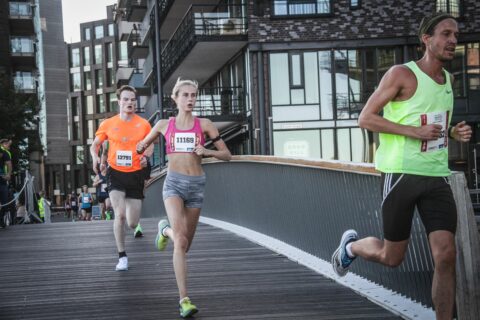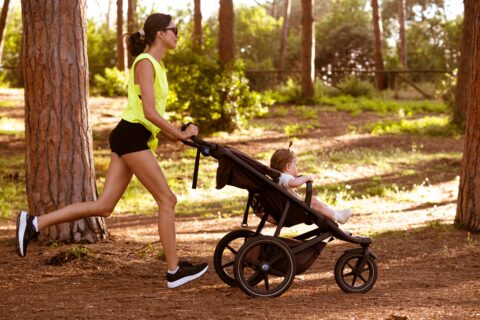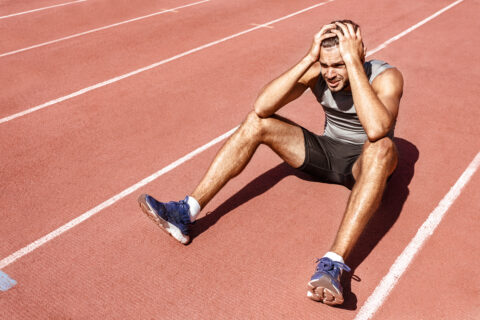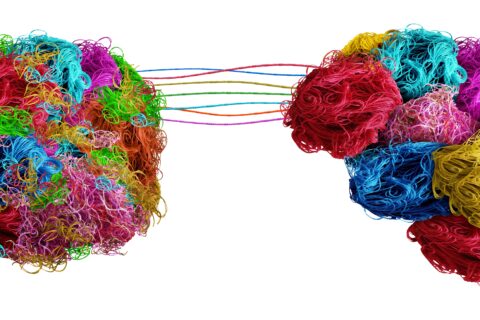Siren Seiler talks about how building a life outside of running helps her navigate some tough times in her athletic career.
Video Transcript
Siren Seiler 0:03
In December 2021 I got a surgery in my stomach region, which was planned. And everything went very well and nothing very serious, but the recovery time was quite long. From a purely fitness point of view, my fitness or running shape had really declined from, like, August of 2021 to December 2021. Like, I was running less, I got like, I got sick with the flu like two times that half year, and I wasn’t able to run a lot and train a lot. Like, I’ve been looking through my training logs, and it’s just very up and down and very little consistency. So I was just getting in worse shape. And I don’t think I realized how much worse it did get, just from not doing, like, 100 kilometers per week, but just having few—many weeks of very low mileage and almost no running. And after the surgery I was, I was totally on the, on the bottom, or I had to really recover slowly and learn how to walk before I learned how to run again, basically. Because it was very painful to even walk and move a lot. So probably for six weeks, I wasn’t even training. Four weeks I wasn’t training at all. I was—I started to walk uphill on a treadmill slowly, but that was about it. And it was—I was really tired. I felt dizzy. And it really didn’t feel like I had run a quite fast half marathon ever before. That sounded like a utopia at that point. And I just had to realize that I was another athlete or I was in a different place physically then. So I had to kind of start from scratch almost.
Dr. Stephen Seiler 2:21
Yeah, surgery, illness, infection, you know. And a different body. Let’s face it.
Siren Seiler 2:31
Yeah.
Dr. Stephen Seiler 2:31
You know, you weighed, I don’t know, five kilos more, six kilos more, something like that?
Siren Seiler 2:37
Yeah, yeah. For sure.
Dr. Stephen Seiler 2:39
And you got to get used to a different body. So that was all in the mix. And psychologically I know it was a bit tough to look at yourself in the mirror and you’d say, “Wait a minute, is that the runner I knew?” You know?
Siren Seiler 2:52
Yeah.
Dr. Stephen Seiler 2:52
And so you’re kind of retooling and re-going through this and saying, “Yep, this is me. This is the real me.” And—but at the same time, down the road, we start to, you know, once you get past some of this, you also start getting stronger.
Siren Seiler 3:10
Yeah. It was a very tough period. Training-wise I have never felt so out of shape before, probably ever in my life. And I did feel out of place with my own body image. But I also knew that it was very important and necessary to move forward. And I do think that a part of recovery process, when it comes to low energy availability and being too skinny, you have to kind of—to get over that point you have to get a little bit too heavy for your own liking before you can kind of stabilize. And of course something that isn’t talked about much, like when you suppress your own hormones over a few years, they will kind of rebound when you get enough energy back. So I was kind of going through a second puberty. I was really up and down hormonally and experiencing all sorts of things that I hadn’t in many years, which was tough in itself, and I felt very uncomfortable training-wise. I didn’t understand my own body for a while. So and then corona came and I got sick. So I had built up a little bit of fitness and then I lost it all again and got pushed even lower. And I did get—I had some iron deficiency, like almost anemia, and vitamin D deficiency. So things got pretty bad. And I wasn’t feeling so good. But in all of this, I was probably happier than I had been in many years, just because I was in a good environment and I had a boyfriend who I was—who I love very much. And yeah, so things were kind of very good, but also just in terms of running, I wasn’t that good. So…
Dr. Stephen Seiler 5:36
Yeah, but the good thing, or—you know, and we can all relate to this—is that you, we’ve all, we identify ourselves as athletes. You know: I’m a runner, I’m a rower, I’m a cyclist. And when we lose that, it’s an identity crisis. And for you, when you were in an eating disordered state, it was even more of a narrow definition of who you were. But you just tolerated the realities better.
Siren Seiler 6:08
Yeah.
Dr. Stephen Seiler 6:09
Because you are more than just a runner.
Siren Seiler 6:11
Yeah.
Dr. Stephen Seiler 6:12
You know, you were a student, you were a daughter, you were a sister again, you were…and so you had just more depth to you.
Siren Seiler 6:20
Yeah.
Dr. Stephen Seiler 6:20
And it’s—I just can only say, as a father, it’s quite fascinating. It’s terrible to see. But it’s fascinating also, to see just how the brain works, and how it can change. And so you move through a whole lot of stuff, and this boyfriend we’ll call Julian was a good person for you to have in your corner. And Annie and Oslo, very close, seeing everything. And so he slowly takes on some coaching duties for you, I would say. He kind of wanted to be the coach.
Siren Seiler 6:43
[Laughs] Yeah.
Dr. Stephen Seiler 6:55
And Dad got kind of kicked out as coach. But I was okay with that, because I felt like it was the appropriate thing for you. And you could still, we still had secret discussions—not secret, but you know—a little…
Siren Seiler 7:10
Mentor, mentor.
Dr. Stephen Seiler 7:11
…second opinions, I could give second opinions occasionally. But Julian was your coach, and so that’s also been a transition. And I would also say you’re an intelligent athlete, you have been very self-aware all the way through since you were 10 years old. So you’re pretty close to being self-coached, I would say. But you do need, you do like to bounce the ball against the wall of another opinion and kind of get confirmation, play a little bit with ideas. But you own your own training, I think it’s fair to say.
Siren Seiler 7:51
He didn’t have a lot of experience with running in particular, but he did have a lot of experience with just the physical components of sports. Like the strength component is basically the same for every sport, like there’s no running-specific strength or [inaudible]-specific strength. It’s kind of the same principles but you just have to apply it in a suited manner to explore it. And I learned a lot through that, or just through working and talking to him and bouncing the ball back and forth with, like, and get confirmation like is this—this doesn’t sound so smart. Okay, this is a little bit too much. This is a little bit too little. And especially in the period when I was in a build-up phase and from COVID and all of this, part of it was just getting really good control on sleep and fueling around workouts and all these basic things. So we set as a goal for, like, that year to just get these things really good to kind of start living more like top athletes even though I wasn’t in terms of, like, level or my times weren’t top level. At that point.
Dr. Stephen Seiler 9:25
You’re building up a routine.
Siren Seiler 9:27
Yeah.
Dr. Stephen Seiler 9:27
Yeah. And I was listening—yeah—I was listening to Gustav Iden and Kristian Blummenfelt just two days after they had both done fantastic in the Ironman down in Kona. And that’s what they said. They said, “Look, it’s just three things: It’s training, it’s sleep, and it’s fueling.”
Siren Seiler 9:48
Yeah.
Dr. Stephen Seiler 9:48
They didn’t even do any kind of recovery methodologies, any of those things. They said, “No, it just takes too much time. We need more—we need sleep. We would have to give up sleep to do this stuff. So we don’t do it.” So they simplify. And I think that’s what also you have figured out is, hey, an hour’s worth of extra sleep is important. You know, and fueling, you know you guys like to make dinners, you enjoy food. So it’s those three things that kind of work together. It’s not terribly difficult—or it is difficult, but it’s not complicated.
Siren Seiler 10:29
No, that’s the thing, it’s…and also just studying sport science now and actually getting more knowledge about the physiology and all of these things around top performances, I realized that really all of these extra things like rolling and massage and all of these things, it feels nice. And if you want or like it, you should do it, but shouldn’t think that it will kind of cure your very tight hamstring, or it really won’t do a lot except just maybe some psychological relief and momentarily, make you feel better. But what it comes down to really is just sleeping and fueling and training smart. I think.
Dr. Stephen Seiler 11:27
Well, you and I have just lost all chances of having sponsors, like from the rollers or any of the fancy recovery modalities, because we’ve shot all that down. If it’s working for you, keep doing it.
Siren Seiler 11:41
Yeah. I have a roller and I do like my massage pillow. So not to… [laughs] I do like it. But I mean you can’t kind of compensate with that if you don’t sleep and eat enough. That’s my point.
Dr. Stephen Seiler 11:53
Yeah. So we’re back to this kind of a hierarchy of needs, and you got to do the basic stuff, right? And then worry about the details. But don’t flip it. And so, you know, in your learning you’ve learned that. I think you’ve been learning it for years, and now you’ve got, now you’re starting to even find the citations, the research studies, you know? So you’re learning it in a more formal way.
Siren Seiler 12:15
That’s true.
Dr. Stephen Seiler 12:16
As a student.



